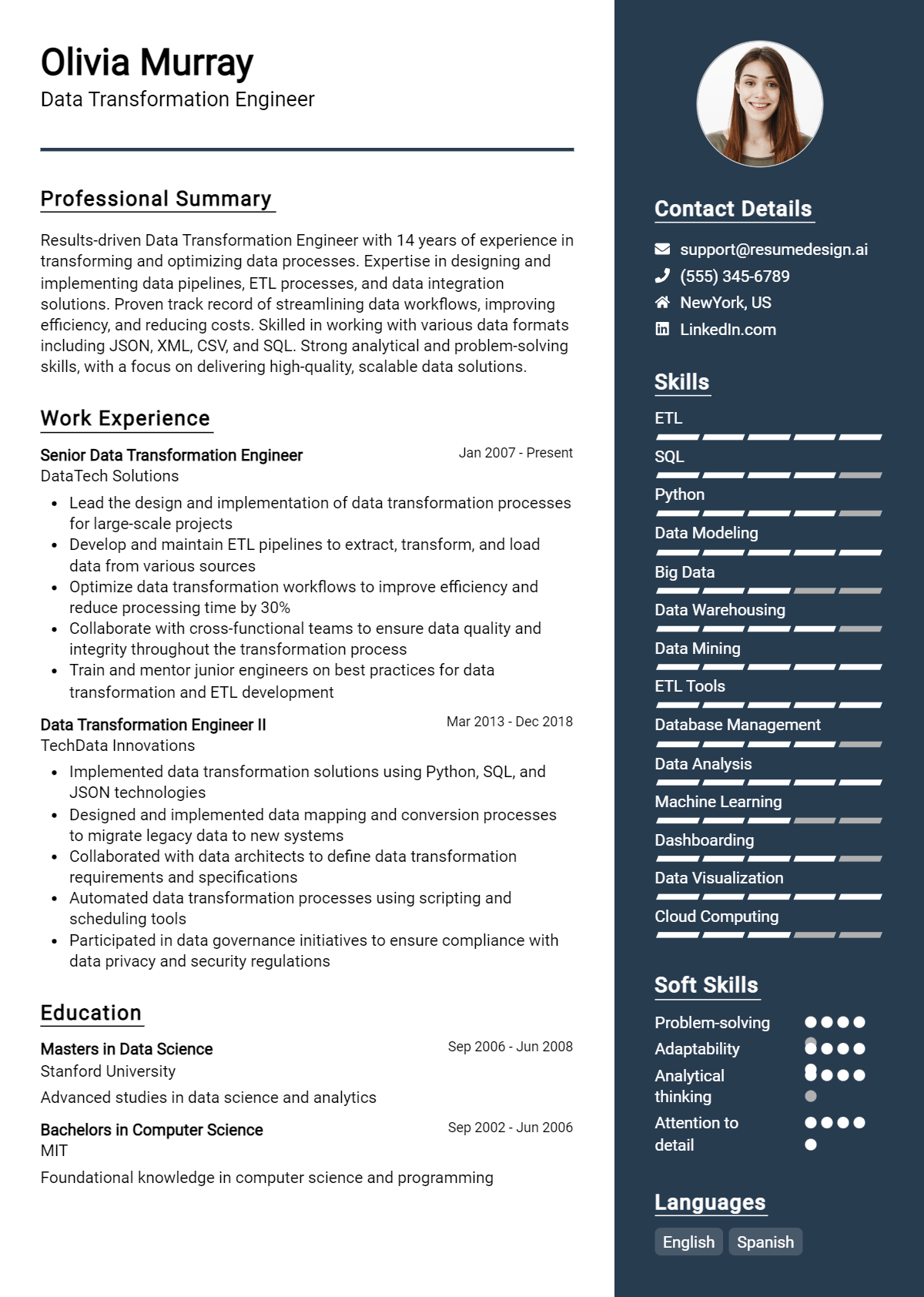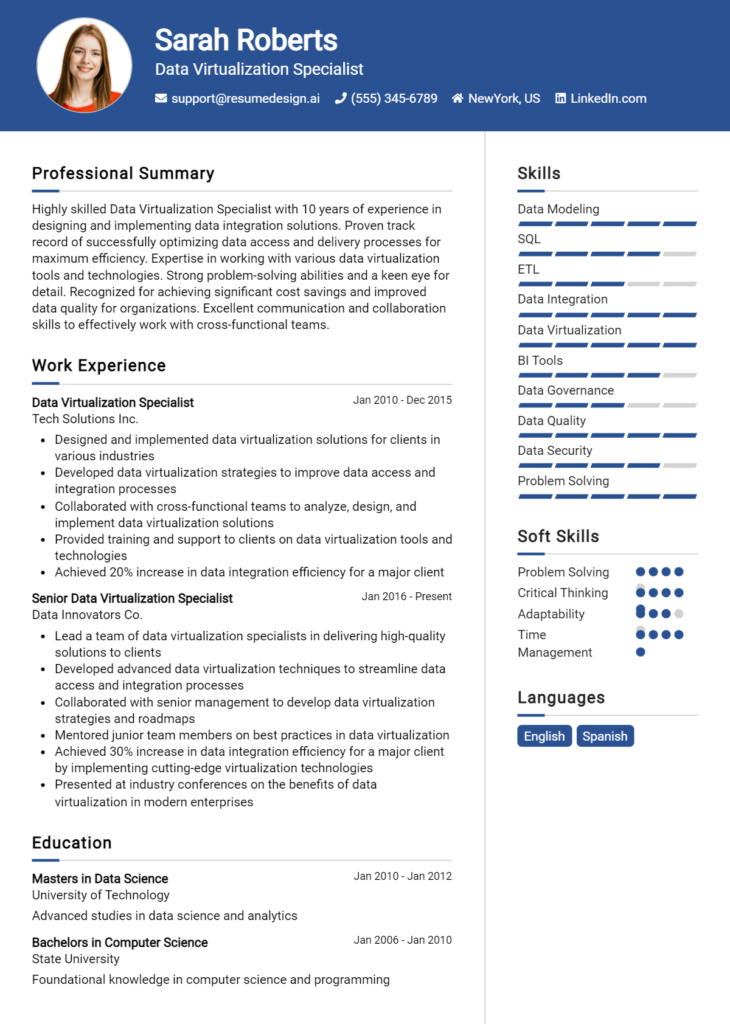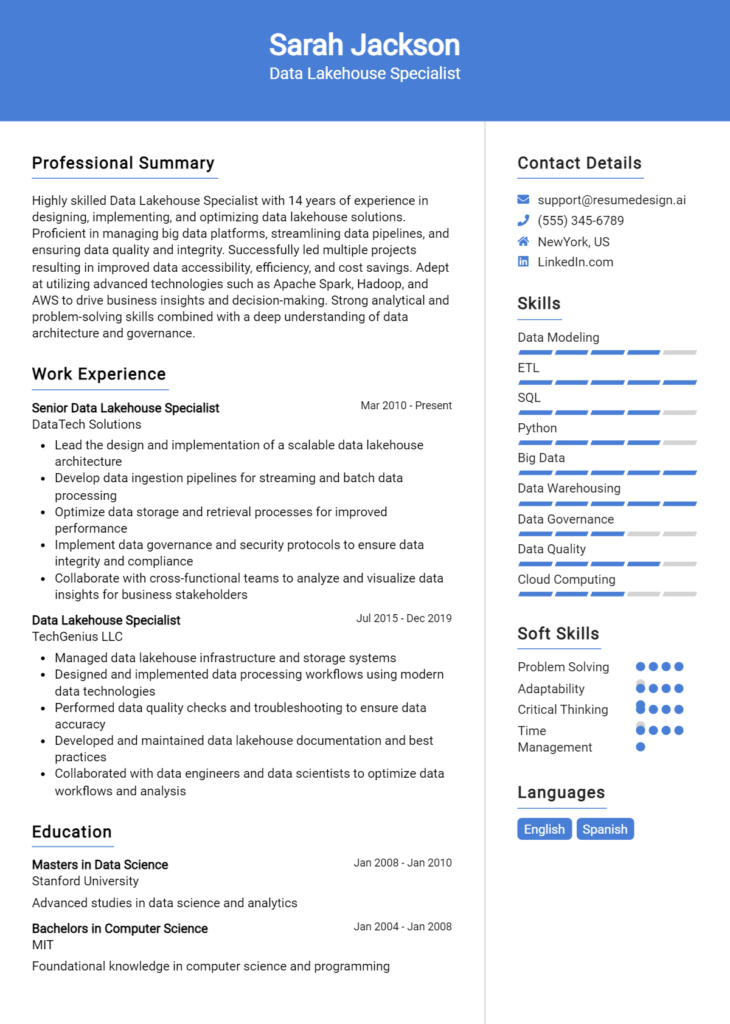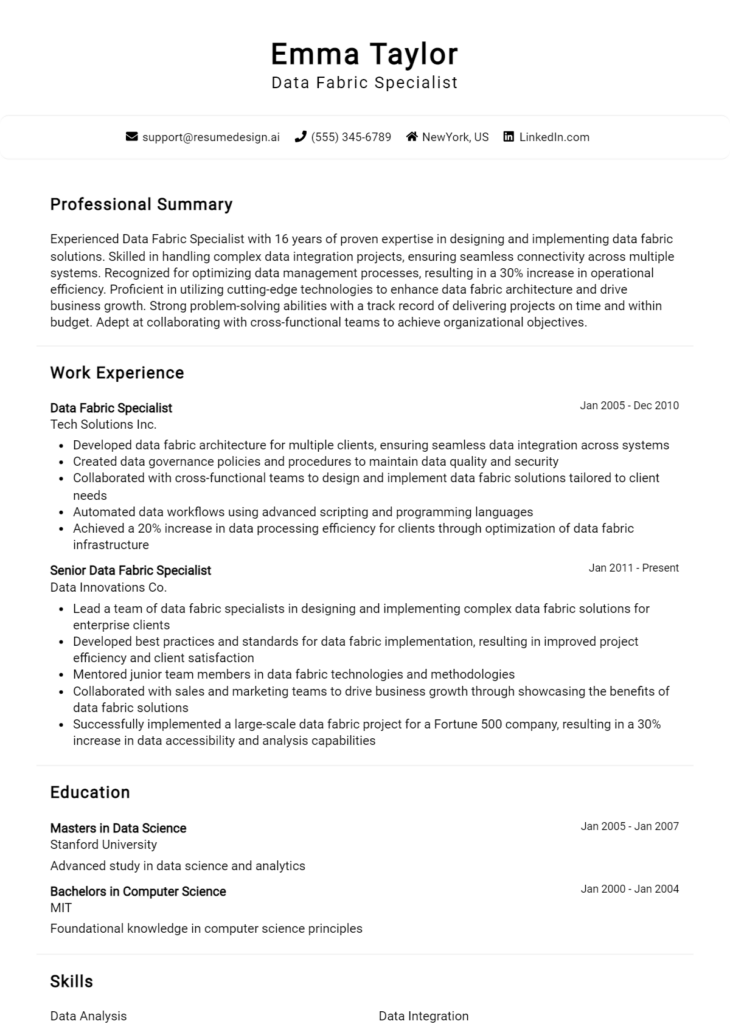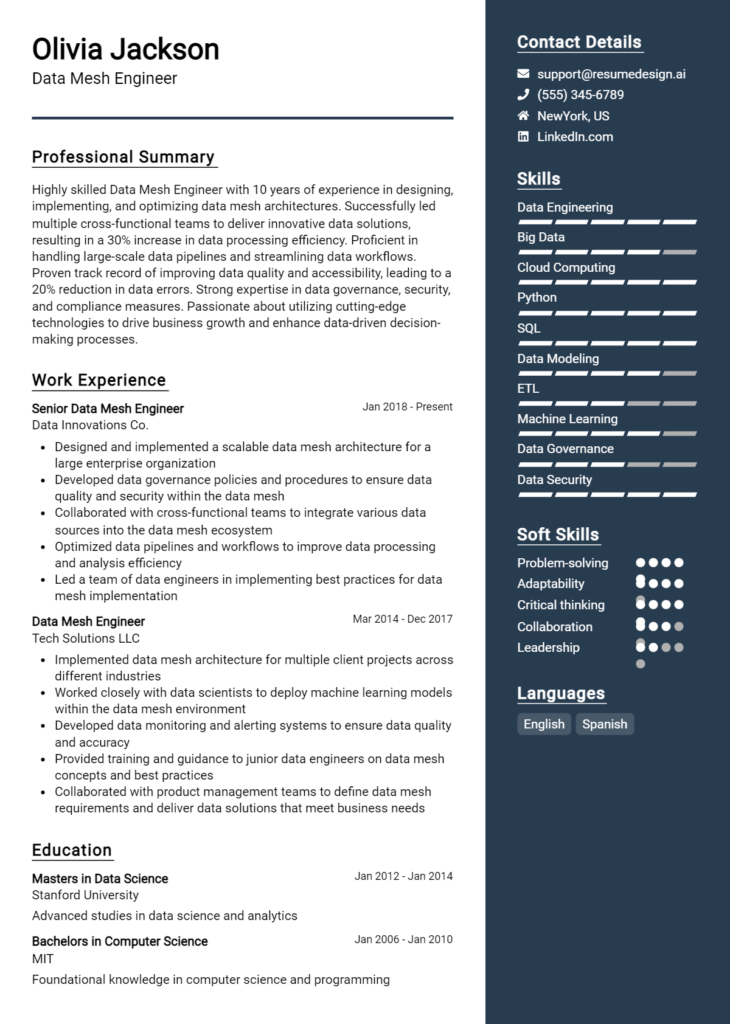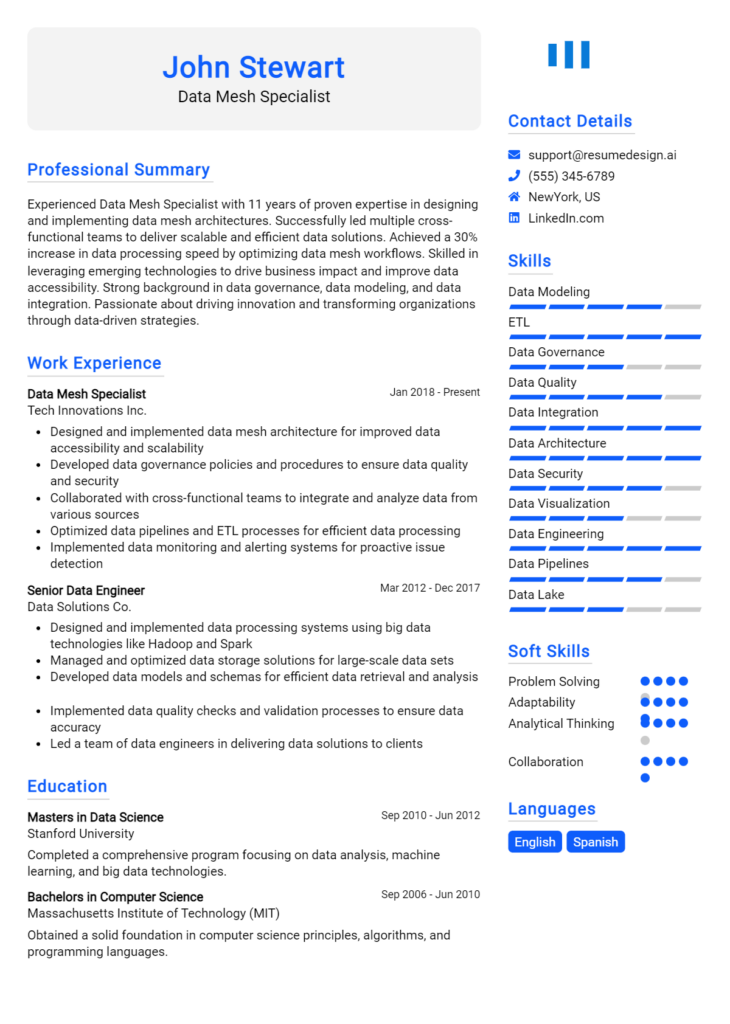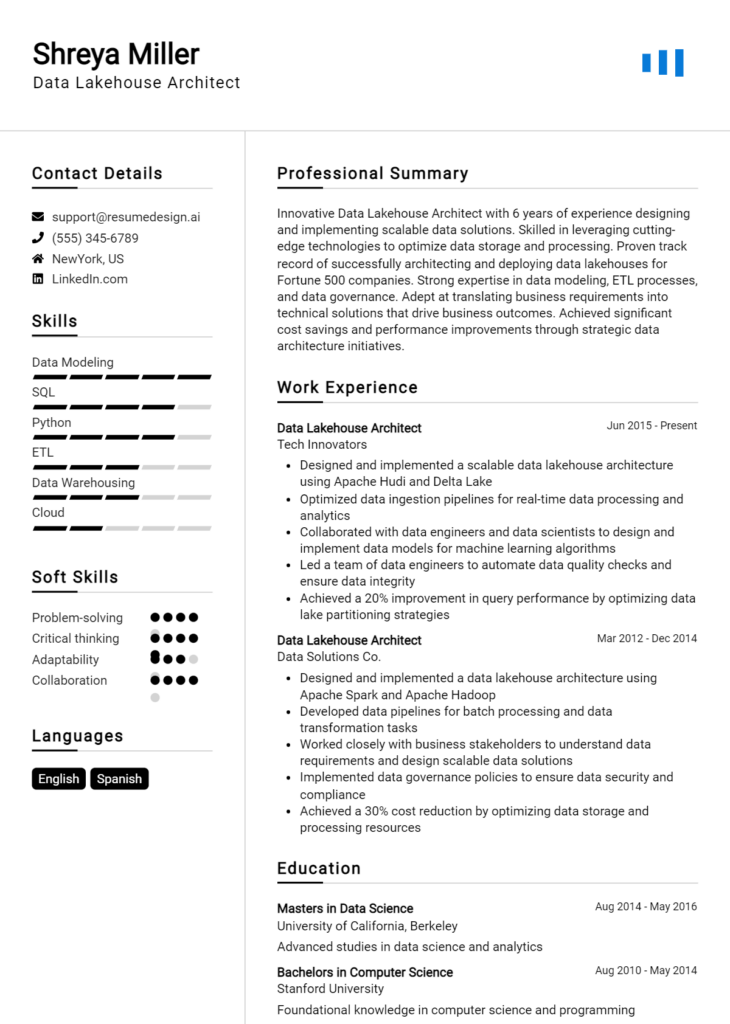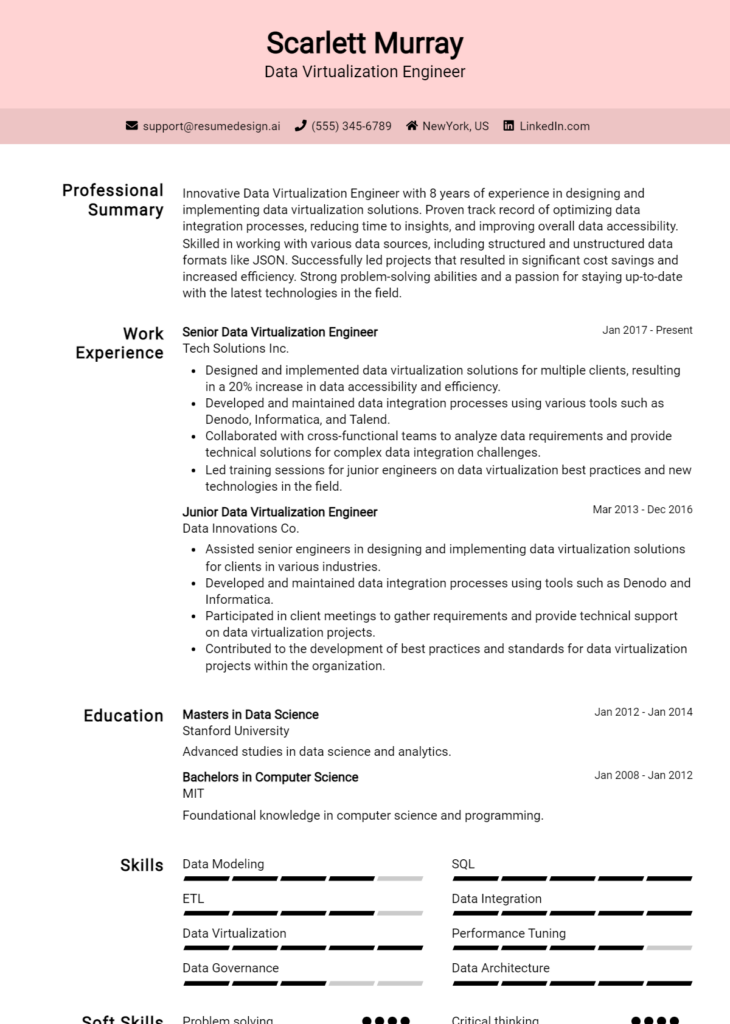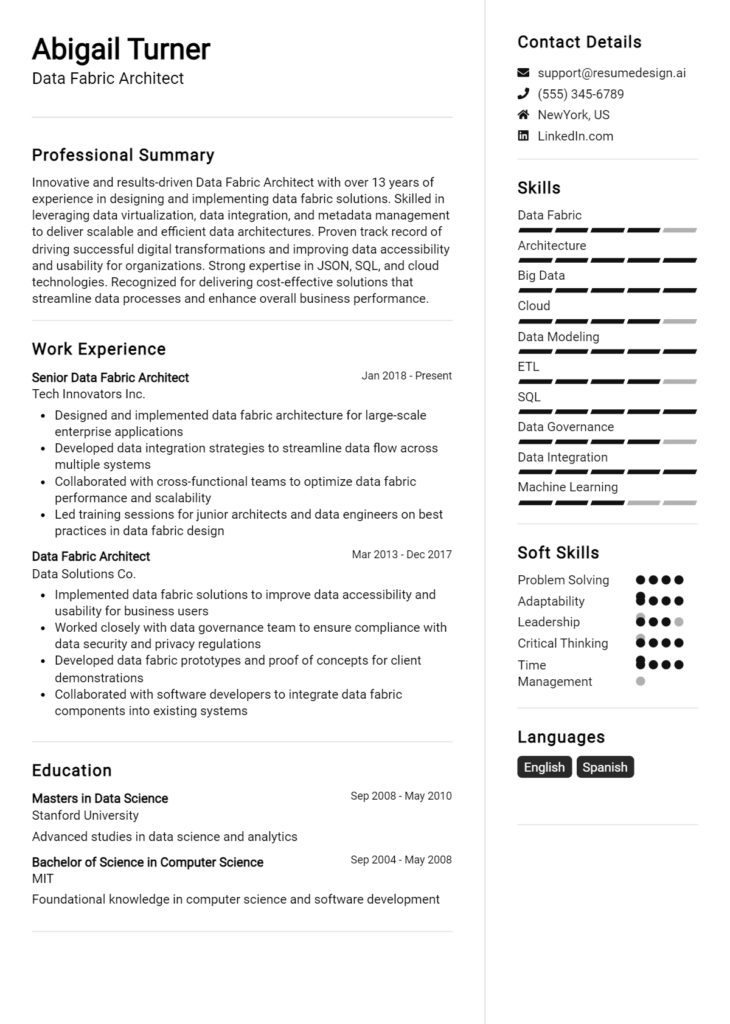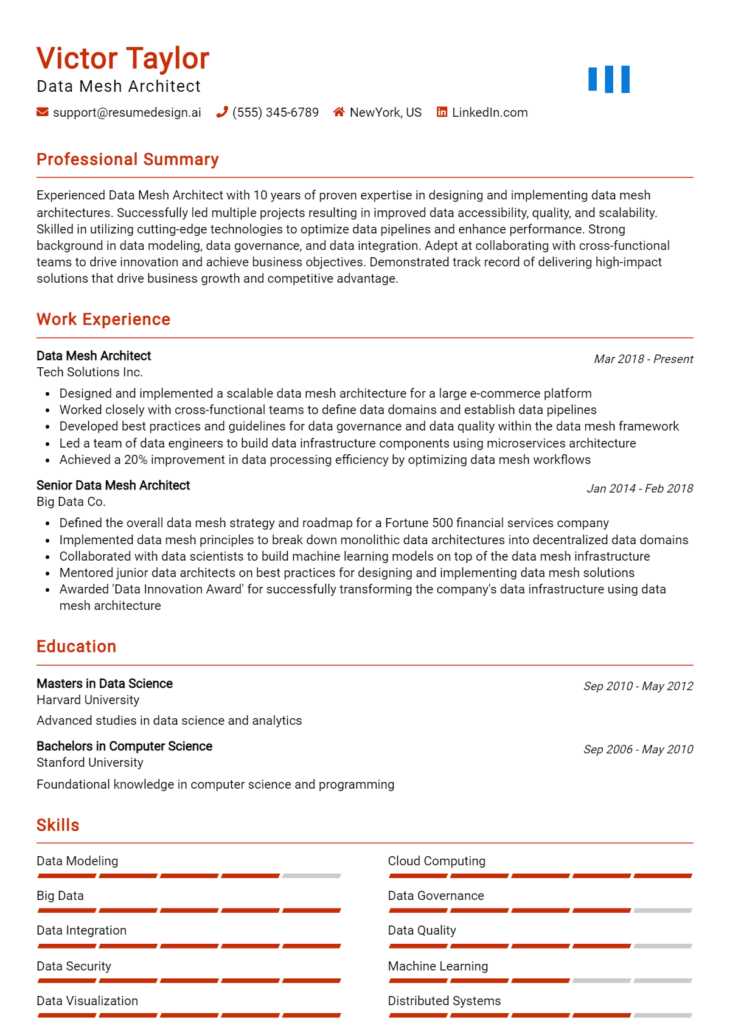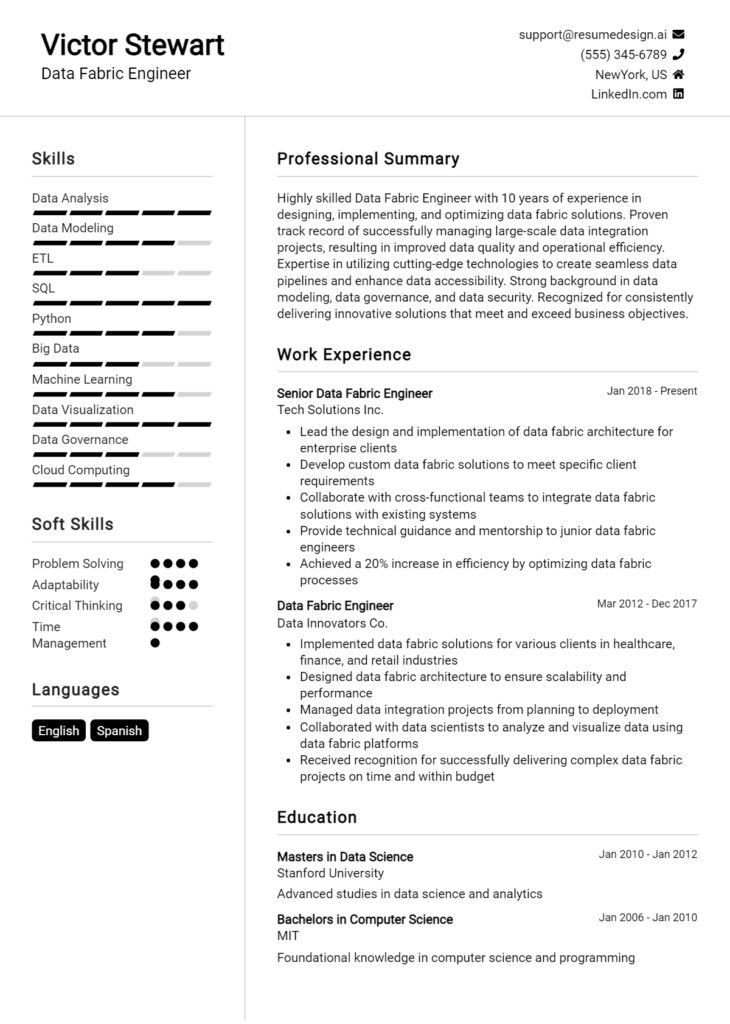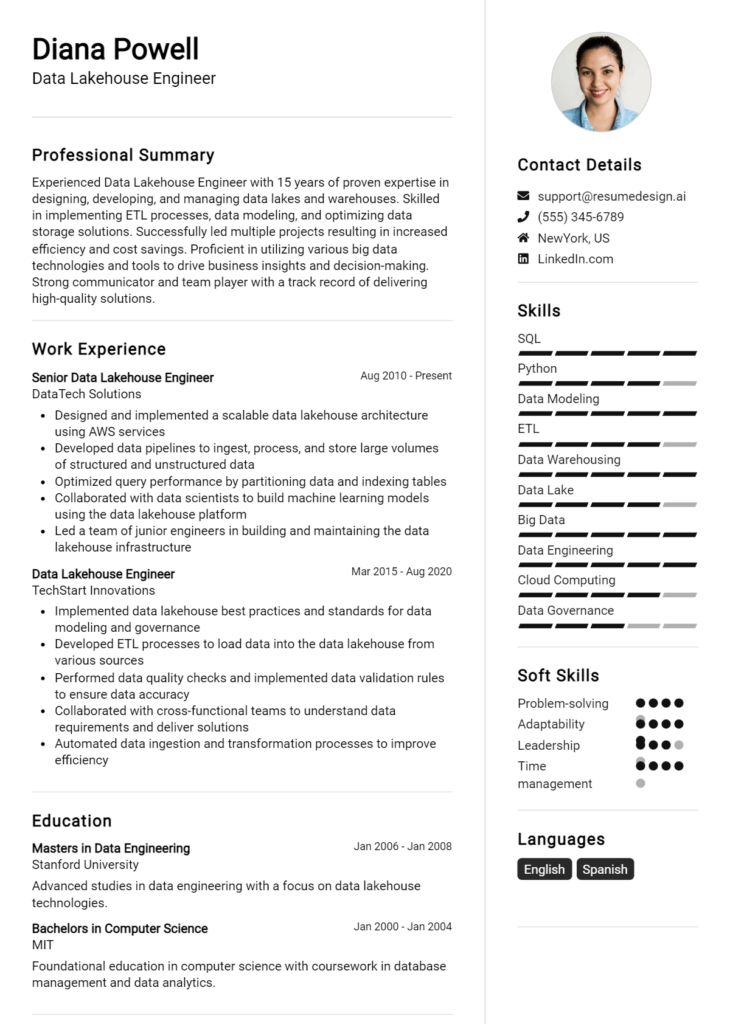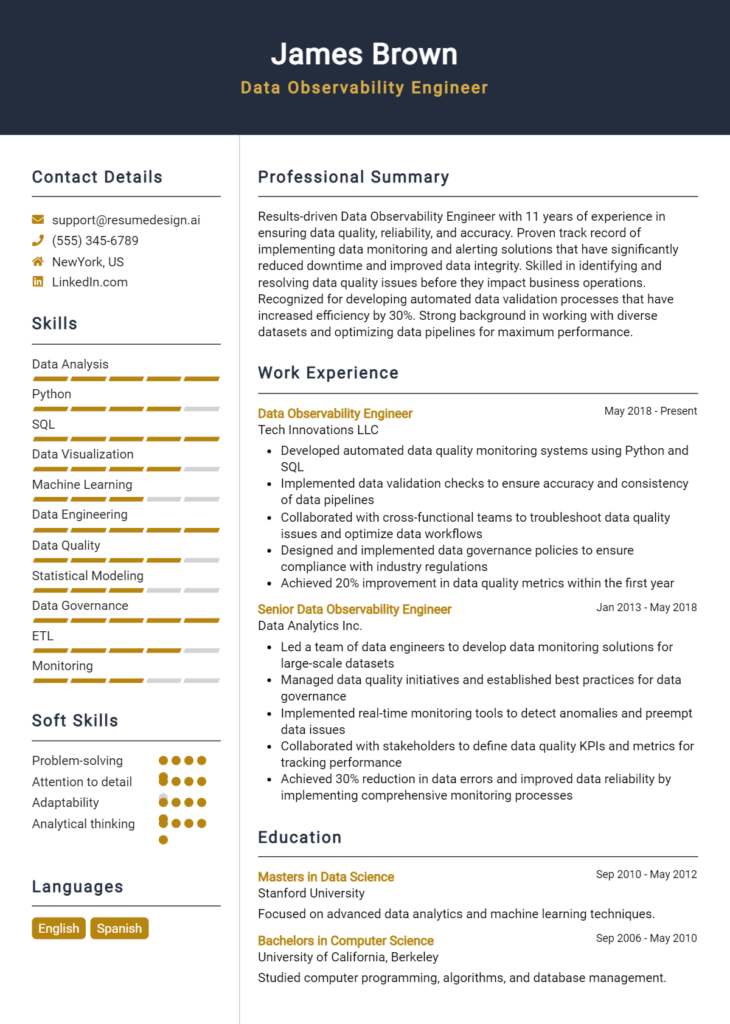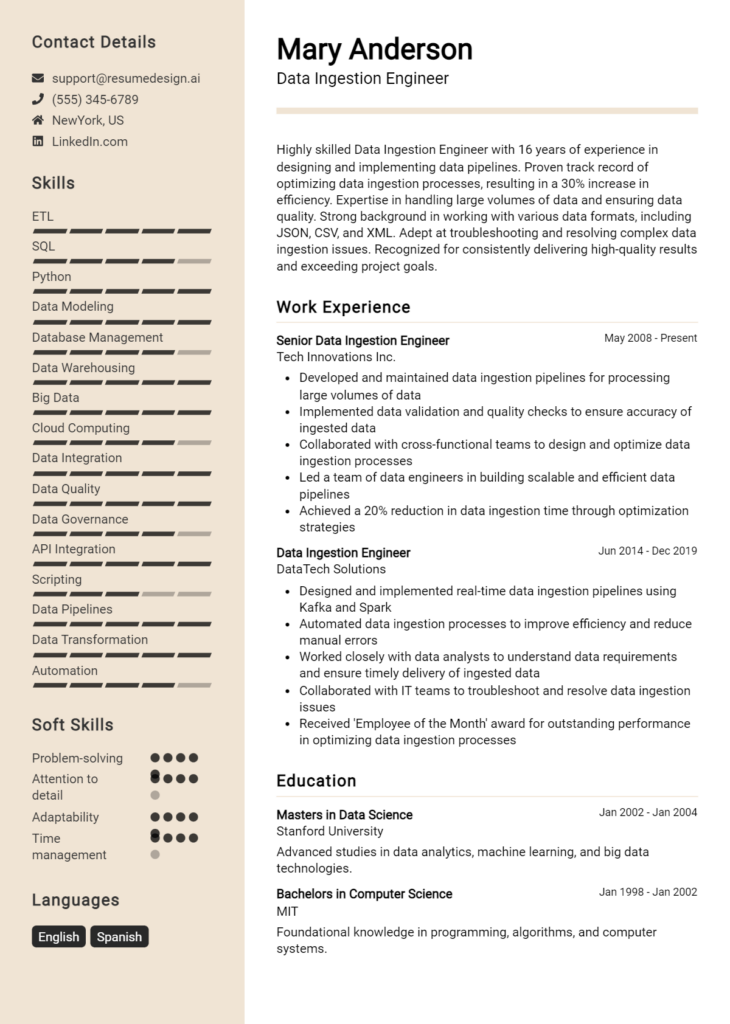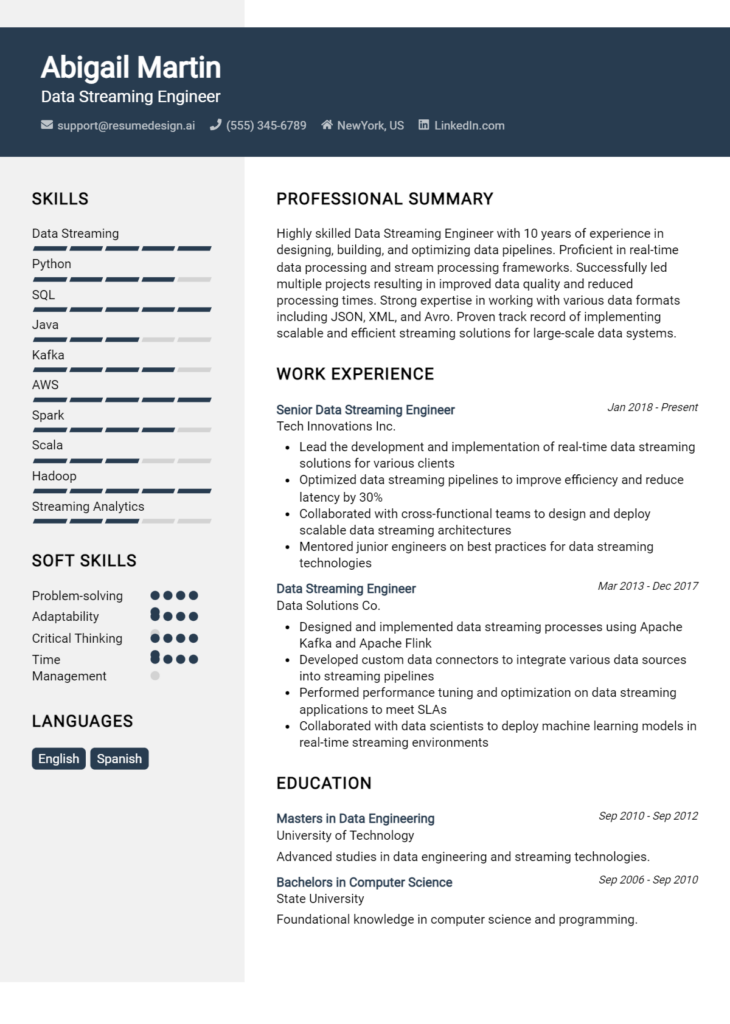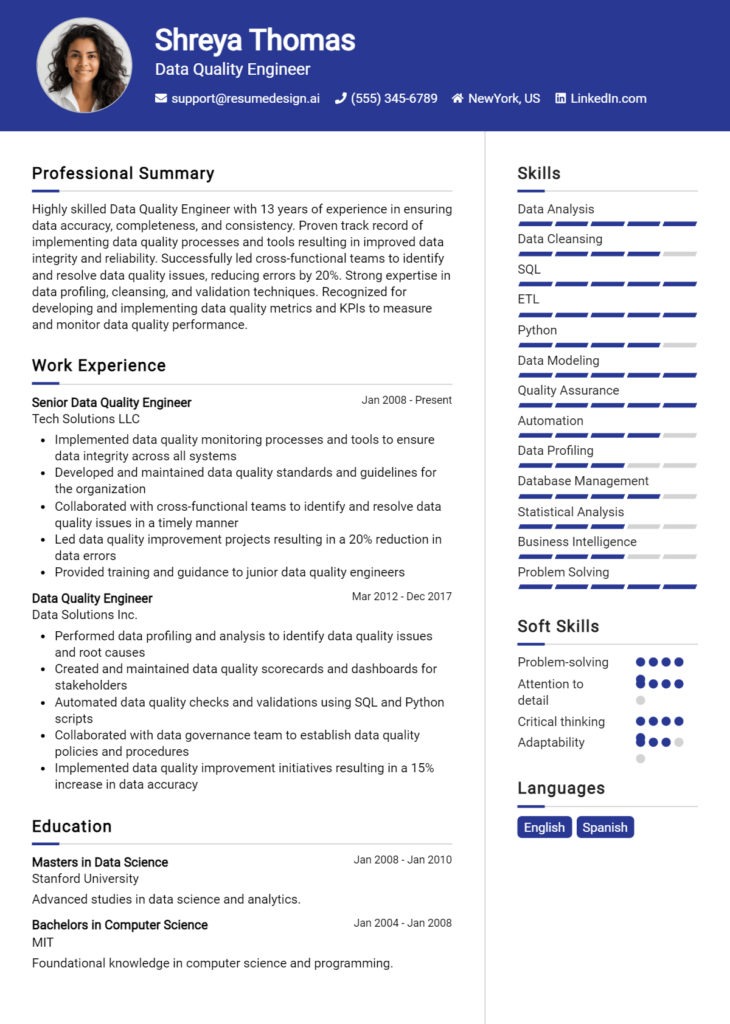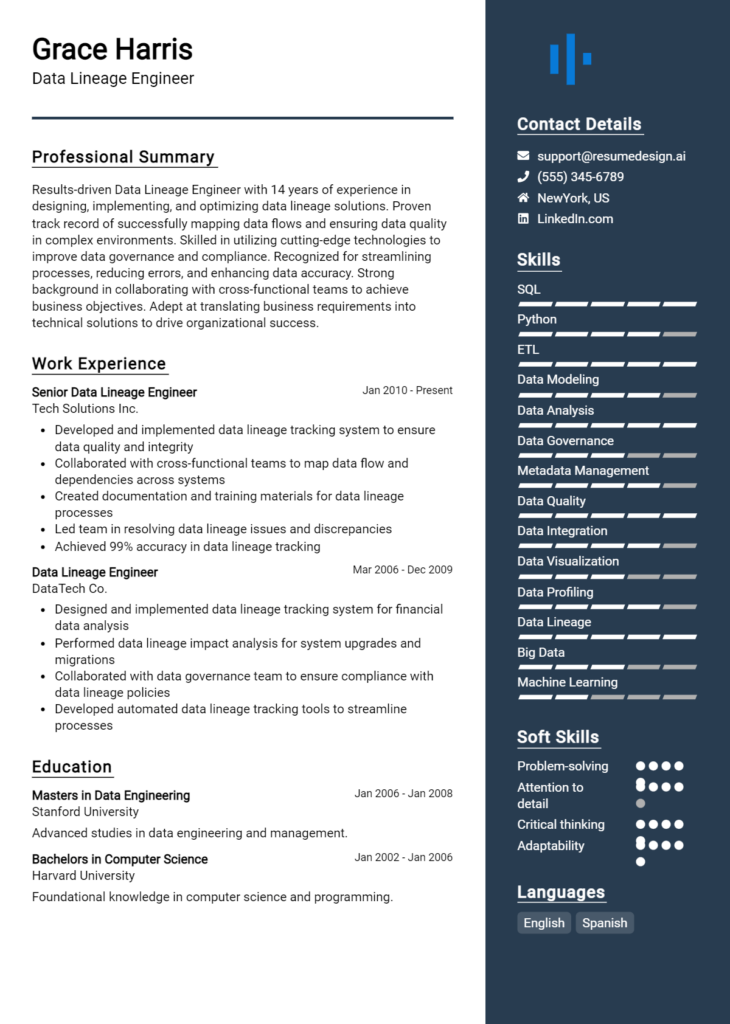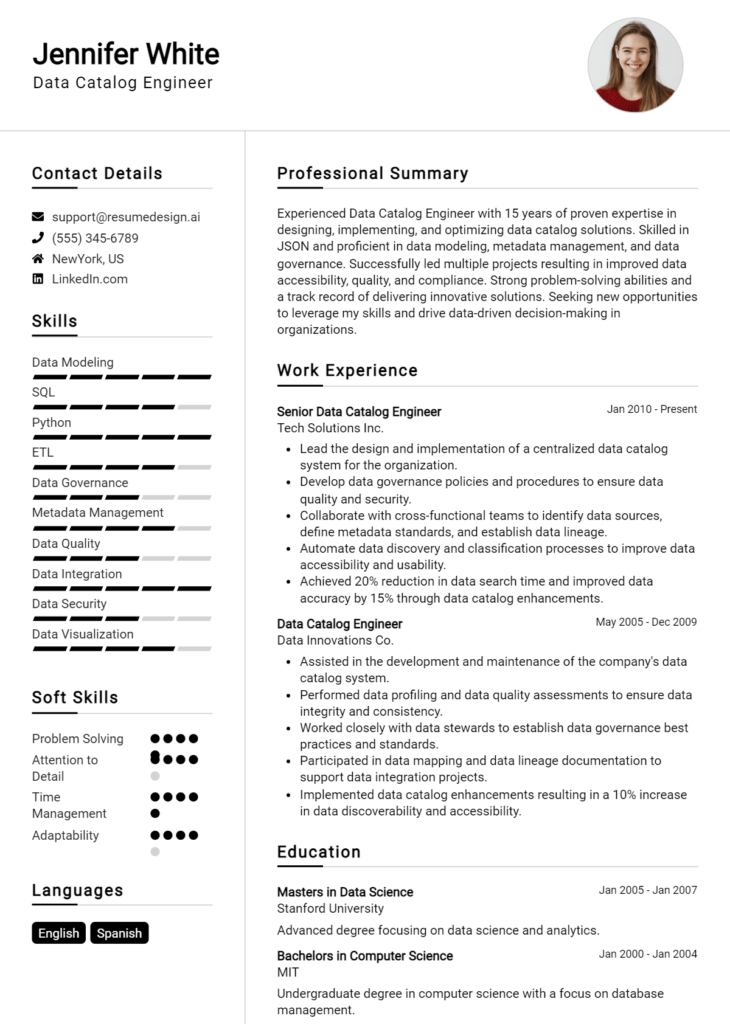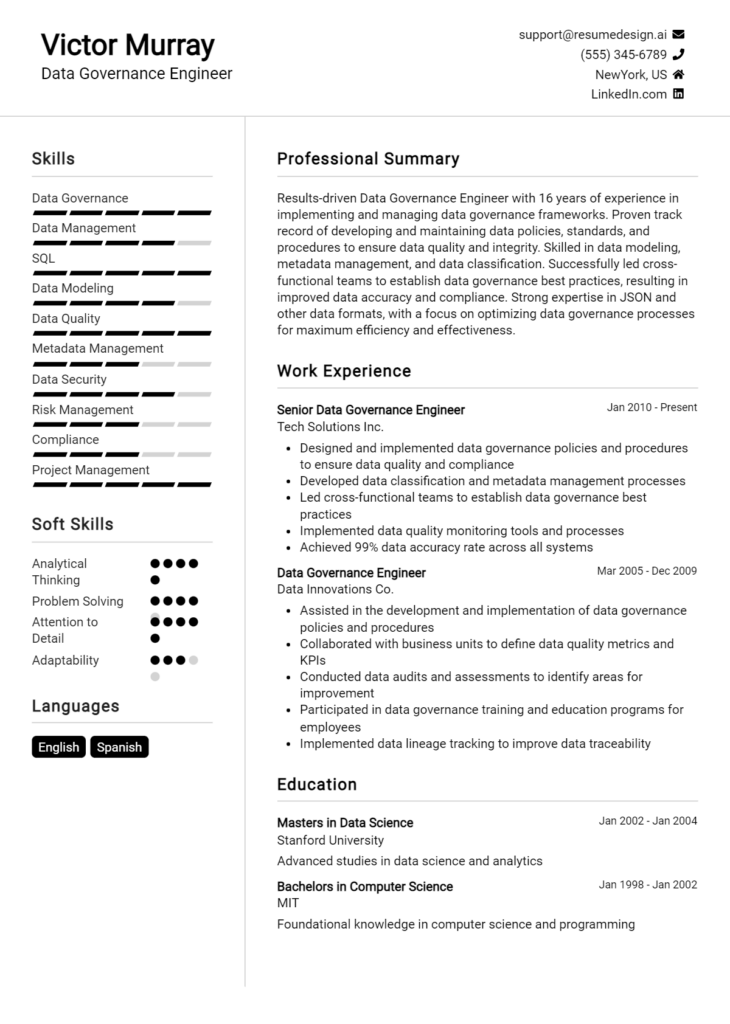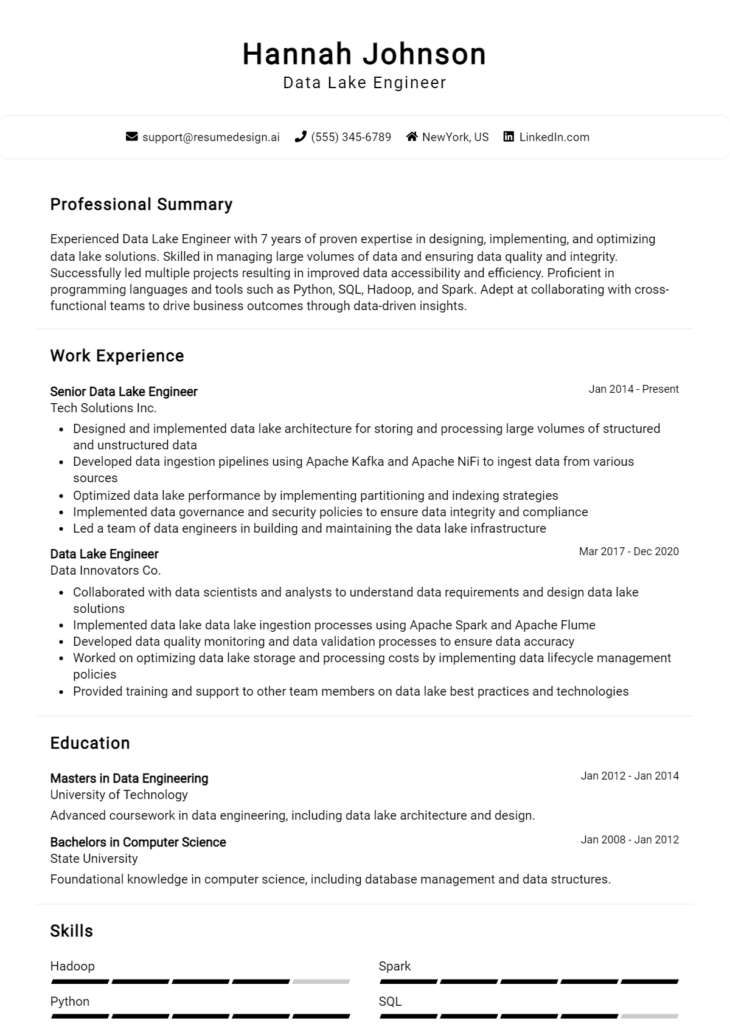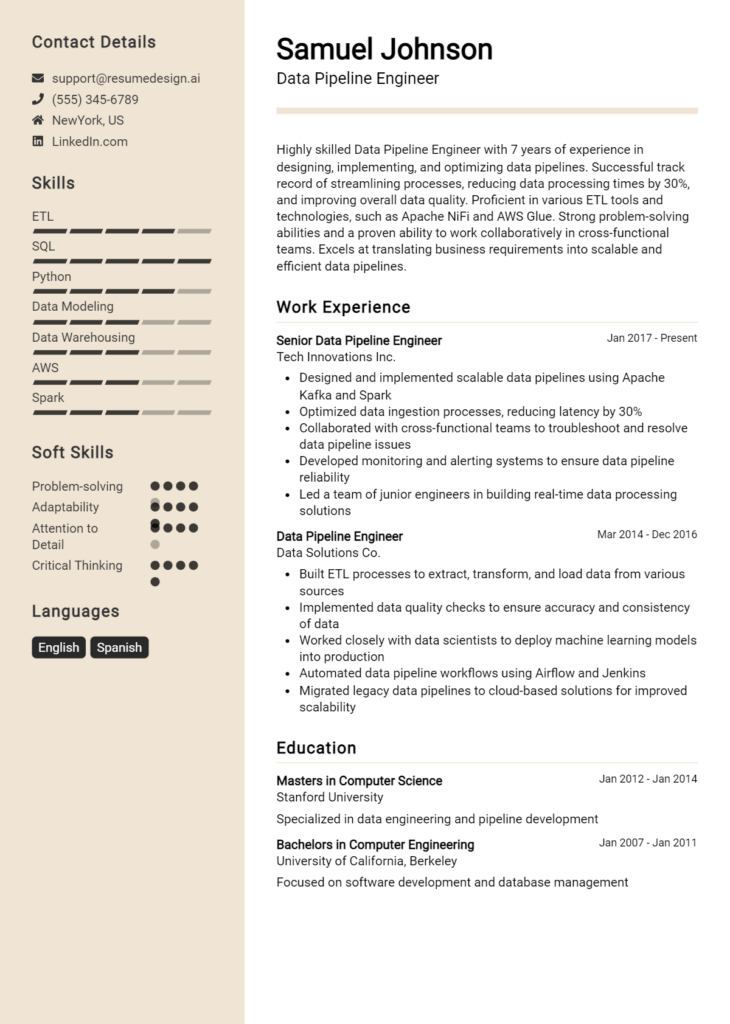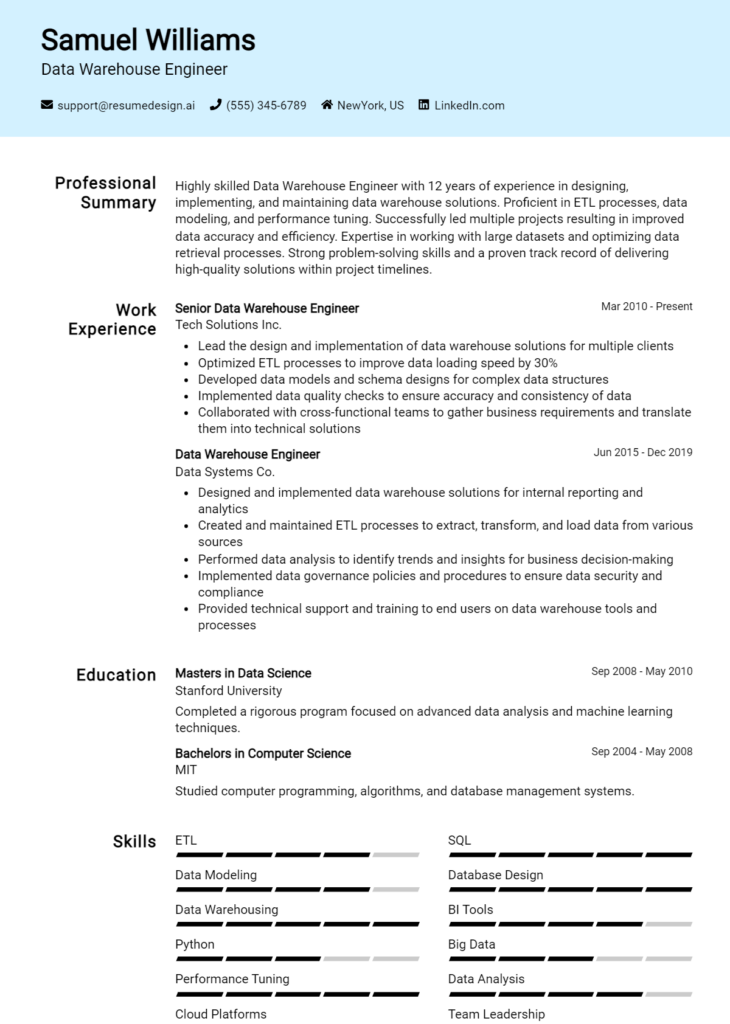Data Transformation Engineer Core Responsibilities
A Data Transformation Engineer plays a crucial role in converting data from various sources into actionable insights, effectively bridging the gap between technical teams and business functions. Key responsibilities include data integration, ETL processes, and maintaining data quality. Essential skills encompass strong analytical capabilities, proficiency in programming languages like SQL and Python, and problem-solving acumen. These abilities drive informed decision-making and align with organizational objectives. A well-crafted resume can effectively highlight these qualifications, showcasing the candidate's impact on business success.
Common Responsibilities Listed on Data Transformation Engineer Resume
- Design and implement data transformation workflows.
- Conduct data cleansing and validation processes.
- Collaborate with cross-functional teams to understand data requirements.
- Optimize ETL processes for performance and efficiency.
- Develop and maintain data pipelines for analytics.
- Monitor data integrity and quality assurance.
- Create documentation for data transformation processes.
- Utilize data visualization tools to present findings.
- Troubleshoot and resolve data-related issues.
- Stay updated with industry trends and technologies.
- Train and support team members on data tools and methodologies.
High-Level Resume Tips for Data Transformation Engineer Professionals
In today's competitive job market, a well-crafted resume is an essential tool for Data Transformation Engineer professionals looking to make a strong impression on potential employers. As the first point of contact between candidates and hiring managers, a resume must effectively showcase not only technical skills but also relevant achievements. It serves as a marketing document that highlights a candidate's ability to transform data into actionable insights, making it crucial for standing out among a sea of applicants. This guide aims to provide practical and actionable resume tips specifically tailored for Data Transformation Engineer professionals, ensuring that your resume reflects the expertise that employers seek.
Top Resume Tips for Data Transformation Engineer Professionals
- Tailor your resume to the job description by incorporating keywords and phrases from the listing to demonstrate alignment with the role.
- Showcase relevant experience by highlighting specific projects where you successfully implemented data transformation solutions.
- Quantify achievements with concrete metrics, such as percentage improvements in data processing time or reductions in data error rates.
- Highlight industry-specific skills, such as proficiency in ETL tools, SQL, data modeling, and cloud platforms like AWS or Azure.
- Include certifications or relevant coursework in data engineering or transformation to enhance your credibility.
- Utilize a clean and professional format that enhances readability, making it easy for hiring managers to quickly identify key information.
- Incorporate a summary statement at the top of your resume that encapsulates your experience and career goals in data transformation.
- Demonstrate soft skills like problem-solving and communication, which are essential for collaborating with cross-functional teams.
- Keep your resume concise, ideally one page, focusing on the most relevant information to maintain the reader's attention.
By implementing these tips, Data Transformation Engineer professionals can significantly enhance their resumes, thereby increasing their chances of landing interviews and ultimately securing a job in this dynamic field. A resume that effectively communicates your skills and achievements can set you apart from the competition and open doors to exciting career opportunities.
Why Resume Headlines & Titles are Important for Data Transformation Engineer
In the competitive landscape of job applications, a Data Transformation Engineer must stand out with an impactful resume headline or title. This concise phrase serves as the first impression for hiring managers, summarizing the candidate's key qualifications and relevance to the role in a single glance. A strong headline not only captures attention but also sets the tone for the rest of the resume, highlighting essential skills, experience, and areas of expertise. Crafting a title that is relevant and directly aligned with the job being applied for is crucial, as it can significantly influence the likelihood of landing an interview.
Best Practices for Crafting Resume Headlines for Data Transformation Engineer
- Keep it concise: Aim for a headline that is no more than 10-12 words.
- Be specific: Clearly state your role and key qualifications relevant to data transformation.
- Highlight key skills: Incorporate essential skills or technologies that align with the job description.
- Use impactful language: Choose powerful words that convey your expertise and experience.
- Tailor for the job: Customize your headline for each application to reflect the specific requirements.
- Quantify achievements: If possible, include metrics or accomplishments that demonstrate your impact.
- Avoid jargon: Use clear language that can be easily understood by hiring managers.
- Focus on value: Emphasize what you bring to the role and how you can contribute to the organization.
Example Resume Headlines for Data Transformation Engineer
Strong Resume Headlines
Data Transformation Engineer with 5+ Years of Experience in ETL and Big Data Solutions
Results-Driven Data Engineer Specializing in Data Warehousing and Analytics
Expert in Data Pipeline Development and Optimization for Enhanced Business Intelligence
Weak Resume Headlines
Engineer Searching for Job
Data Professional
The strong headlines are effective because they are specific, highlight relevant skills, and convey the candidate’s experience in a clear and compelling manner. They immediately inform hiring managers about the candidate’s qualifications and what they bring to the table. In contrast, the weak headlines lack specificity and relevance, failing to capture attention or provide any meaningful insight into the candidate’s qualifications. Such vague titles can easily be overlooked in a sea of applications, making them less effective in securing an interview opportunity.
Writing an Exceptional Data Transformation Engineer Resume Summary
A well-crafted resume summary is essential for a Data Transformation Engineer, as it serves as the first impression to potential employers. The summary quickly captures the attention of hiring managers by succinctly showcasing key skills, relevant experience, and notable accomplishments that align with the job role. In a highly competitive job market, a strong summary not only highlights a candidate's qualifications but also demonstrates their understanding of the industry and specific job requirements. It should be concise, impactful, and tailored to the particular position being applied for, ensuring that the candidate stands out among a sea of applicants.
Best Practices for Writing a Data Transformation Engineer Resume Summary
- Quantify achievements to showcase the impact of your work.
- Focus on relevant technical skills, such as data modeling, ETL processes, and programming languages.
- Tailor the summary for the job description, incorporating keywords from the posting.
- Highlight specific accomplishments that demonstrate your expertise in data transformation projects.
- Keep it concise, ideally between 2-4 sentences.
- Avoid jargon or overly complex language; be clear and straightforward.
- Emphasize both technical and soft skills, like problem-solving and teamwork.
- Use active language to convey confidence and proactivity.
Example Data Transformation Engineer Resume Summaries
Strong Resume Summaries
Results-driven Data Transformation Engineer with over 5 years of experience in designing and implementing ETL processes that improved data accuracy by 30%. Proficient in SQL, Python, and data visualization tools, effectively transforming complex datasets into actionable insights for business stakeholders.
Detail-oriented Data Transformation Engineer with a proven track record of managing data migration projects that reduced processing time by 40%. Adept at collaborating with cross-functional teams to streamline data workflows and enhance reporting capabilities using advanced analytics techniques.
Innovative Data Transformation Engineer specializing in big data solutions, with expertise in Apache Spark and Hadoop. Successfully led a project that increased data processing speed by 50%, resulting in improved decision-making for key business operations.
Weak Resume Summaries
Experienced engineer looking for a position in data transformation. Skilled in various tools and technologies.
Data professional with knowledge in data processing and transformation. Seeking a role to utilize my skills.
The examples of strong resume summaries are considered effective because they highlight specific skills and quantify accomplishments, making it clear how the candidate has added value in previous roles. They are tailored to the position and demonstrate a clear understanding of the requirements. In contrast, the weak resume summaries are vague and lack measurable outcomes or specific skills, which makes them less compelling and less likely to catch the attention of hiring managers.
Work Experience Section for Data Transformation Engineer Resume
The work experience section of a Data Transformation Engineer resume is crucial as it serves as a comprehensive showcase of the candidate's technical skills and competencies. This section not only highlights their ability to manage teams effectively but also demonstrates their capability to deliver high-quality products that meet industry standards. By quantifying achievements and aligning experiences with industry benchmarks, candidates can significantly enhance their appeal to potential employers, making it clear how their contributions can drive value within a data-driven environment.
Best Practices for Data Transformation Engineer Work Experience
- Use clear and concise language to describe your roles and responsibilities.
- Quantify achievements with metrics, such as improved data processing times or increased data accuracy.
- Highlight specific technologies and tools used in data transformation projects.
- Emphasize collaboration with cross-functional teams to showcase teamwork and communication skills.
- Detail project outcomes and their impact on the organization.
- Align your experience with industry standards and best practices to demonstrate relevance.
- Include any leadership roles or mentorship experiences within the data transformation space.
- Tailor your work experience to the job description, focusing on relevant skills and experiences.
Example Work Experiences for Data Transformation Engineer
Strong Experiences
- Led a team of 5 engineers in a data migration project that reduced processing time by 40%, resulting in a cost savings of $150,000 annually.
- Developed an ETL pipeline using Apache Spark that improved data quality by 30% and increased reporting efficiency for stakeholders.
- Collaborated with data analysts and business units to design a centralized data warehouse, enabling a 25% increase in data retrieval speed.
- Implemented data governance practices that enhanced compliance with industry regulations, reducing audit issues by 50% over two years.
Weak Experiences
- Worked on various data projects that involved some data cleaning tasks.
- Assisted in the development of databases and wrote some SQL queries.
- Participated in team meetings to discuss data-related issues.
- Helped colleagues with data transformation processes occasionally.
The examples provided above are considered strong because they include specific, quantifiable outcomes that demonstrate clear impact and technical leadership. They reflect a proactive approach to problem-solving and collaboration, showcasing the candidate's ability to drive results. In contrast, the weak experiences lack detail and fail to convey the candidate's contributions meaningfully, resulting in vague statements that do not effectively highlight their skills or achievements.
Education and Certifications Section for Data Transformation Engineer Resume
The education and certifications section of a Data Transformation Engineer resume is crucial for establishing a candidate's qualifications and expertise in the field. This section not only highlights the academic background of the candidate but also showcases industry-relevant certifications and ongoing learning efforts that are essential for success in the rapidly evolving data landscape. By providing details on relevant coursework, specialized training, and recognized certifications, candidates can significantly enhance their credibility and demonstrate their alignment with the specific demands of the Data Transformation Engineer role.
Best Practices for Data Transformation Engineer Education and Certifications
- Prioritize the most relevant degrees and certifications that align with data transformation roles.
- Include advanced degrees such as a Master's in Data Science or a related field to showcase higher education.
- Highlight industry-recognized certifications, such as those from Microsoft, AWS, or Google Cloud, to increase credibility.
- Detail relevant coursework that directly pertains to data transformation techniques and technologies.
- Ensure all certifications are current and reflect the latest industry standards and practices.
- Consider including online courses or boot camps that provide practical skills in data transformation tools.
- Use a clear and organized format that allows hiring managers to quickly assess qualifications.
- Update the section regularly to reflect new qualifications or trainings that enhance your skillset.
Example Education and Certifications for Data Transformation Engineer
Strong Examples
- M.S. in Data Science, University of XYZ, 2020
- Certified Data Management Professional (CDMP), 2021
- Google Cloud Professional Data Engineer Certification, 2022
- Relevant Coursework: Advanced Data Analytics, Data Warehousing, ETL Processes
Weak Examples
- Bachelor's in Philosophy, University of ABC, 2015
- Certification in Basic Computer Skills, 2018
- Old Certification in Data Entry (2008)
- Relevant Coursework: Introduction to Sociology, Creative Writing
The strong examples listed above are considered effective because they directly relate to the skills and knowledge required for a Data Transformation Engineer, showcasing relevant degrees, current certifications, and applicable coursework. In contrast, the weak examples lack relevance to the field, either due to outdated or unrelated subjects that do not contribute to the candidate's qualifications in data transformation, thereby diminishing their appeal to potential employers.
Top Skills & Keywords for Data Transformation Engineer Resume
In the rapidly evolving field of data engineering, a Data Transformation Engineer plays a crucial role in ensuring that data is accurately processed, converted, and stored for analytical purposes. The skills showcased on a Data Transformation Engineer resume not only highlight technical expertise but also reflect the candidate's ability to collaborate, innovate, and solve complex problems. A well-rounded skill set that includes both hard and soft skills can significantly enhance a candidate's profile, making them more attractive to potential employers. For anyone looking to excel in this role, understanding which skills to emphasize can be the difference between landing an interview and getting overlooked.
Top Hard & Soft Skills for Data Transformation Engineer
Soft Skills
- Analytical Thinking
- Problem Solving
- Communication Skills
- Team Collaboration
- Adaptability
- Attention to Detail
- Time Management
- Critical Thinking
- Creativity
- Project Management
Hard Skills
- SQL and NoSQL Databases
- Data Warehousing Solutions
- ETL (Extract, Transform, Load) Processes
- Data Modeling Techniques
- Python or R for Data Manipulation
- Cloud Platforms (AWS, Azure, GCP)
- Data Visualization Tools (Tableau, Power BI)
- Data Quality Assurance
- Big Data Technologies (Hadoop, Spark)
- API Integration and Data Services
Having a robust blend of these skills is essential for a Data Transformation Engineer, as it not only showcases technical proficiency but also demonstrates the ability to work effectively within a team and adapt to changing project requirements. Additionally, a well-structured work experience section can further highlight how these skills have been applied in real-world scenarios, reinforcing a candidate's suitability for the role.
Stand Out with a Winning Data Transformation Engineer Cover Letter
Dear [Hiring Manager's Name],
I am writing to express my strong interest in the Data Transformation Engineer position at [Company Name], as advertised on [where you found the job listing]. With a robust background in data engineering and a passion for transforming raw data into actionable insights, I believe I am well-equipped to contribute effectively to your team. My experience in designing and implementing ETL processes, coupled with my proficiency in various data transformation tools, positions me to help streamline data workflows and enhance the overall data infrastructure at [Company Name].
In my previous role at [Previous Company Name], I spearheaded a project that involved migrating legacy data systems to a modern cloud-based architecture. This initiative not only improved data accessibility and processing speed but also resulted in a 30% reduction in data retrieval time for our analytics team. My expertise in SQL, Python, and data visualization tools like Tableau enabled me to create robust data pipelines that ensured data quality and integrity throughout the transformation process. I am excited about the opportunity to bring my technical skills and problem-solving abilities to [Company Name] as you continue to leverage data for strategic decision-making.
I am particularly drawn to [Company Name]'s commitment to innovation and excellence in data management. I admire your recent initiatives in [mention any relevant projects or initiatives of the company], and I see a great opportunity to contribute to such forward-thinking endeavors. I am eager to collaborate with cross-functional teams to not only optimize existing data processes but also to explore new technologies that can further enhance data transformation capabilities.
Thank you for considering my application. I look forward to the opportunity to discuss how my background, skills, and enthusiasms align with the goals of [Company Name]. I am excited about the possibility of contributing to your team and helping drive impactful data transformation initiatives.
Sincerely,
[Your Name]
[Your LinkedIn Profile]
[Your Contact Information]
Common Mistakes to Avoid in a Data Transformation Engineer Resume
When crafting a resume for a Data Transformation Engineer position, it’s crucial to present your skills and experiences effectively. However, many candidates make common mistakes that can undermine their chances of landing an interview. Avoiding these pitfalls can enhance your resume's impact and showcase your qualifications in the best light.
Lack of Tailoring: Failing to customize your resume for the specific job description can result in missing key skills and experiences that align with the role. Always adjust your resume to highlight relevant qualifications.
Overloading with Jargon: While technical terminology is important, excessive jargon can confuse recruiters. Aim for clarity and ensure that your resume is understandable to both technical and non-technical audiences.
Ignoring Quantifiable Achievements: Simply listing responsibilities without quantifying your achievements can make your contributions seem less impactful. Use metrics to demonstrate how your work has positively influenced past projects.
Neglecting Soft Skills: Data transformation isn’t just about technical skills; soft skills like communication, teamwork, and problem-solving are equally important. Be sure to include examples that showcase these abilities.
Inconsistent Formatting: A cluttered or inconsistent format can detract from the professionalism of your resume. Keep fonts, bullet points, and spacing uniform to create a clean and polished look.
Using Passive Language: Phrasing your accomplishments in passive voice can weaken their impact. Use active voice to convey confidence and ownership of your work.
Excluding Relevant Projects: Often, candidates overlook personal or academic projects that demonstrate relevant skills. Including these projects can provide additional evidence of your capabilities and commitment to your field.
Omitting Keywords: Many companies use applicant tracking systems (ATS) to filter resumes. Failing to include relevant keywords from the job posting can result in your resume being overlooked. Be sure to incorporate important terms to improve your chances of passing through these filters.
Conclusion
In summary, the role of a Data Transformation Engineer is crucial in the modern data landscape, where the ability to efficiently transform and manipulate data can significantly impact organizational decision-making. We discussed the essential skills required for this position, including proficiency in data modeling, ETL (Extract, Transform, Load) processes, and a solid understanding of database management systems. Additionally, we highlighted the importance of effective communication and collaboration with cross-functional teams to ensure that data solutions align with business objectives.
As you reflect on this vital role, take a moment to review your resume to ensure it effectively showcases your qualifications and experience. Whether you're entering the job market or seeking a new opportunity, having a polished resume can make all the difference. Consider utilizing resources such as resume templates, a user-friendly resume builder, and resume examples to help highlight your skills. Don't forget to complement your resume with a professional touch by exploring our cover letter templates. Take action today to enhance your job application materials and set yourself apart in this competitive field!

